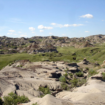Catholic School Division working towards inclusion of Indigenous culture
By Ry Clarke - Lethbridge Herald Local Journalism Initiative Reporter on September 8, 2022.
 Herald photo by Ry Clarke
Holy Spirit School Divisions First Nation, Metis, and Inuit support workers meet Wednesday at St. Francis Junior High School to discuss FMNI education, collaborating on ways to include Indigenous culture in the classroom.
Herald photo by Ry Clarke
Holy Spirit School Divisions First Nation, Metis, and Inuit support workers meet Wednesday at St. Francis Junior High School to discuss FMNI education, collaborating on ways to include Indigenous culture in the classroom.Holy Spirit Catholic School Division is working towards an inclusive school environment that fosters education towards Indigenous culture in its classrooms.
With First Nations, Metis and Inuit support workers adding critical members to the team, they work in schools to provide support, education, and resources for young learners. Contributions to the education include learning the Blackfoot language, knowledge and expertise towards school programming, and facilitating relationships with community members.
“My passion and dream was always to include elders into our classrooms, incorporating them into subjects that are already taught. To be involved in the classroom and to share our Blackfoot knowledge,” said Emily Fox, FMNI support worker at Catholic Central High School. “I try to adopt a new elder, someone different to share their knowledge and gifts, because not all elders are all the same. Then we get a variety of knowledge.”
St. Basil Catholic Education Centre will host a Sharing Circle on September 21st for Division 1 and 2 teachers to take part in an Elder Storytelling, infusing Indigenous perspectives into learning and creating a talking stick for them to take back to their classrooms. Learning coaches will connect the lessons into the new curriculum to make the learning a part of classroom teaching.
“Our teachers are being more educated in First Nations culture and reconciliation with everything that’s happening. Becoming more comfortable teaching it in the classroom. So now it’s not going to be that one First Nations meeting at work or at the school, our teachers are feeling comfortable doing it, teaching culture and identity,” said Billy Woitte, FMNI support worker at St. Francis Junior High School.
Schools are incorporating FMNI education into various levels of school activities, helping spread knowledge and culture with inclusion.
“Another way for connection and making sure the students in this area know that we’re on Treaty 7 land is we’re starting to get Blackfoot names in our schools. Principals are doing morning greetings in English, French, and Blackfoot. ‘O Canada’ is sung in English, French, and Blackfoot. I think it’s important, as we are all learning together,” said Woitte.
“If our knowledge doesn’t get passed down to the younger generation, it’s not going to continue on, it’s going to end with our elders or our knowledge keepers. It’s important to be able to pass that down to younger generations so that they know it,” said Traven Weasel Traveller, FNMI support worker at St. Teresa of Calcutta. “Teachers will book time with me and I’ll go into their class for a period. I’ll explain smudges and what is the purpose of it. I’ll bring language, teaching kids a few words and Blackfoot, with readings. As they learn those, I expand on it.”
Weasel Traveller notes when he was a kid transitioning from school on the reserve to the city, he was never told any Blackfoot stories, like Napi, saying there was not a lot of places that he could hear them as a kid, but now he is able to come into classrooms and teach them.
“They are receptive to them, because when I tell them I ask: Was he wrong? Mischievous? There is always a lesson to be learned. I tell them when they’re listening to these stories, listen for the lesson that’s trying to be taught in the story. The kids do listen to the stories and they ask questions about them.”
Knowledge is key when it comes to learning, and inclusion helps broaden the mind while expanding values. With teachers and staff working towards reconciliation we are seeing a younger generation of learners grow wiser with new levels of knowledge being added to the lessons they learn.
“With awareness, don’t be scared to ask questions, reach out to your school and see if they have a First Nations worker. If not, they would have someone at the board office, whether it’s public or Holy Spirit. Reach out, ask those questions and just be informed,” said Woitte.
13-12




